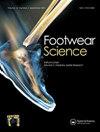The effect of functional orthotic rearfoot posting on in-vivo tibial strain
IF 3.8
Q2 ERGONOMICS
引用次数: 0
Abstract
Abstract Medial tibial stress fractures occur secondary to failure in shear. It has been proposed that the use of functional foot orthotics (FFOs) may decrease their incidence by positioning the subtalar joint in the neutral position at heel strike. The purpose of this study was to evaluate the scientific basis of this concept by in-vivo measurement of tibial principal strain, the principal strain angle and shear strains during treadmill walking from rosette strain gauges bonded to the tibia of a male subject at two sites prone to stress fracture. Recordings were made while wearing Rockport walking shoes without orthotics, with non-posted graphite orthotics, with neutral rearfoot posted polypropylene orthotics, with 4° varus rearfoot posted polypropylene orthotics, and with neutral rearfoot posted kinetic wedge polypropylene orthotics designed to treat hallux limitus. None of the various modifications of FFOs tested in this study had a statistically significant effect on the compression strains during treadmill walking compared to the walking shoe alone, indicating that they were not affective in attenuating the ground reaction force. Their use was associated with a 22–51% increase in principal (p < .001) and a 9–35% increase in tibial shear strains (p = .003). The compression and shear strains and the angle of the principal strains (p < .001) were higher at the distal than at the proximal recording site, (p < .001 for all). The findings do not support the use of FFOs in any of the posting configurations tested as a means for lowering tibial shear strains or the concept of the biomechanical importance of the neutral position of the subtalar joint at heel strike.功能性足后矫形器对体内胫骨劳损的影响
胫骨内侧应力性骨折继发于剪切失败。已经提出使用功能性足矫形器(ffo)可以通过将距下关节定位在脚跟撞击的中立位置来减少其发生率。本研究的目的是通过在体内测量一名男性受试者胫骨易发生应力骨折的两个部位的主应变、主应变角和跑步机行走时的剪切应变,来评估这一概念的科学基础。在不带矫形器的Rockport步行鞋、无固定石墨矫形器、中性后足贴片聚丙烯矫形器、4°内翻后足贴片聚丙烯矫形器和中性后足贴片动态楔形矫形器治疗拇趾限制时进行记录。与单独的步行鞋相比,本研究中测试的ffo的各种修改对跑步机行走时的压缩应变都没有统计学上的显著影响,这表明它们在减弱地面反作用力方面没有效果。它们的使用与本金增加22-51% (p < 0.001)和胫骨剪切应变增加9-35% (p = 0.003)相关。远端压缩应变、剪切应变和主应变角(p < 0.001)高于近端记录部位(p < 0.001)。对所有人来说都是001)。研究结果不支持将ffo作为降低胫骨剪切应变的一种手段,也不支持距下关节在脚跟撞击时中立位置的生物力学重要性。
本文章由计算机程序翻译,如有差异,请以英文原文为准。
求助全文
约1分钟内获得全文
求助全文

 求助内容:
求助内容: 应助结果提醒方式:
应助结果提醒方式:


